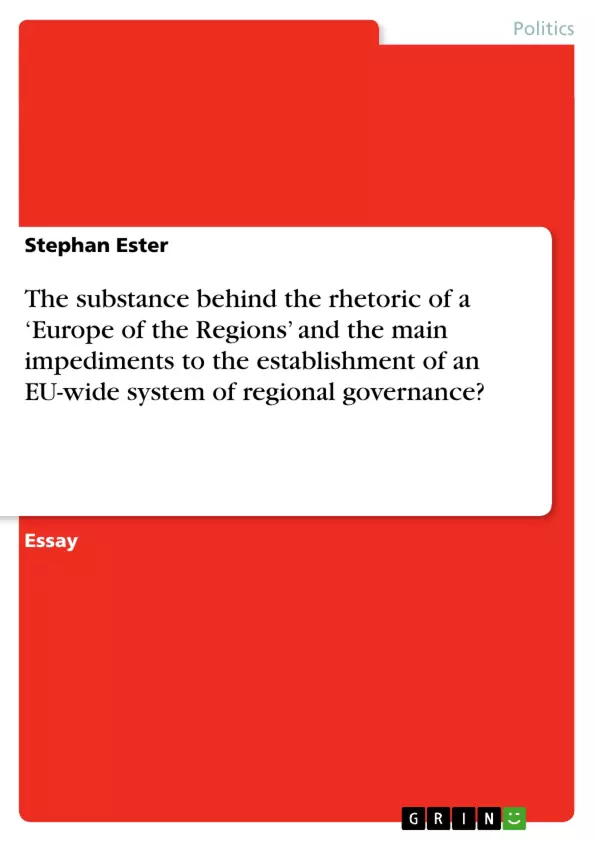The term ‘Europe of the Regions’ has been used over the last decades either to describe one of the supposed effects of the integration process on European governance or as a normative goal in the sense of a post-national Europe. Proponents of a Europe of the Regions assume that the combined effect of European integration at the top and regional decentralisation at the bottom will eventually lead to a dissolving of the traditional nation state in Europe. Others reject this view and see this development rather as the emergence of a new form of multilevel governance within the existing framework of national and European institutions. The regional element of the EU can be retraced to the establishment of the European Regional Development Fund (ERDF) in 1975 but, as Harvie points out, since that time regional development has taken a dynamic of its own which challenges the traditional nation state: ‘Regionalisation, the chopping-up of problems into manageable areas, has given way to a subjective and aggressive regionalism.’ Regions have doubtlessly established themselves as key players in European governance. The purpose of this essay is to clarify whether a Europe of the regions is a viable option in practice and whether it is desirable at all. To answer this question, this essay will first of all clarify the ambiguous term ‘region’ and analyse different concepts of regional governance in several EU countries. In a next step, it will examine the various ways of access and influence that regions can have on the EU policy process and assess the viability of these approaches. Furthermore, the role of regionalist and minority nationalist parties in promoting (or impeding) a regionalised Europe will be highlighted. Finally, the findings of this essay will be summed up to find out whether there is really substance behind the slogan of a Europe of the regions.
[...]
Inhaltsverzeichnis (Table of Contents)
- Introduction
- Forms of Sub-National Government in the European Union
- Access of Regions to the EU Policy Process
Zielsetzung und Themenschwerpunkte (Objectives and Key Themes)
This essay aims to examine the viability and desirability of a "Europe of the Regions," analyzing whether the rhetoric surrounding this concept holds substance. It explores the varying forms of regional governance within the EU and assesses the effectiveness of regional access to the EU policy process.
- The definition and diverse forms of regional governance across the EU.
- The different channels of regional access to EU policy-making (intra-state and extra-state).
- The role of regionalist and nationalist movements in shaping European governance.
- The impact of decentralization on the traditional nation-state.
- The potential for a shift from "hard-bordered" to "soft-bordered" regional governance.
Zusammenfassung der Kapitel (Chapter Summaries)
Introduction: Introduces the concept of a "Europe of the Regions," outlining the debate surrounding its effects on European governance. It establishes the essay's objective to determine the practicality and desirability of this concept.
Forms of Sub-National Government in the European Union: This chapter examines the diverse forms of sub-national government within the EU, highlighting the differences in regional autonomy and constitutional independence across member states. It categorizes these into four models based on constitutional frameworks.
Access of Regions to the EU Policy Process: This section analyzes the various channels through which regions can access and influence EU institutions. It explores both intra-state channels (indirect access via the nation-state) and extra-state channels (direct access). The role of inter-regional associations and the Committee of the Regions (COR) are discussed.
Schlüsselwörter (Keywords)
Europe of the Regions, regional governance, EU policy, decentralization, sub-national government, regional autonomy, nation-state, multilevel governance, regionalism, nationalism, Committee of the Regions (COR), ERDF.
Frequently Asked Questions
What does the term 'Europe of the Regions' signify?
It describes a normative goal or an effect of integration where traditional nation-states dissolve in favor of a multilevel governance system involving powerful regional entities.
What was the role of the ERDF in regional development?
The establishment of the European Regional Development Fund (ERDF) in 1975 marked the beginning of regions becoming key players in European governance and economic policy.
How do regions access the EU policy process?
Regions use intra-state channels (indirectly through their nation-state) and extra-state channels (direct representation in Brussels and inter-regional associations).
What is the function of the Committee of the Regions (COR)?
The COR serves as a formal advisory body within the EU, allowing sub-national governments to have a direct voice in the legislative process.
What are the main impediments to EU-wide regional governance?
The primary challenges include the diverse constitutional frameworks of member states and varying levels of regional autonomy, which make a uniform system difficult to establish.
Is a 'Europe of the Regions' a viable option in practice?
The essay evaluates whether this concept is a realistic future for Europe or merely a slogan, considering the persistence of national institutions and multilevel governance.
- Citar trabajo
- Stephan Ester (Autor), 2006, The substance behind the rhetoric of a ‘Europe of the Regions’ and the main impediments to the establishment of an EU-wide system of regional governance?, Múnich, GRIN Verlag, https://www.grin.com/document/120915



